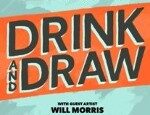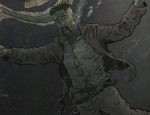 I love comic conventions.
I love comic conventions.
There’s no better way to spend a weekend than walking around, basking in the enthusiasm and talent of fellow comic creators. I love seeing what everyone’s been up to since we last crossed paths, being introduced to new creators and new comics – and I can’t get enough of the jolt of encouragement it gives me to get back to the drawing board myself and make more comics.
Conventions are also a great place to ask other artists, editors and publishers for advice on your work. This is sometimes called a portfolio review, and I think we often have a preconceived notion of how they work.
Years ago I heard an anecdote from a now big-name American artist. As a youngster, this artist would attend their local comic convention every year. It would usually have three or four attending pros there, one of the regulars being the legendary Will Eisner. Again and again, this artist queued at the great Mr. Eisner’s table to show him their latest work and ask for advice. And every year Will would offer suggestions on composition, anatomy or whatever. After a decade or so the artist got frustrated and asked outright the question they really wanted answered: ‘I’ve been in this line every year since I was a kid. Can you tell me what it is I need to do to become a professional comic artist?’
And, the story goes, Will Eisner smiled at the young artist and beckoned at the queue of hopefuls waiting for a moment with the master. ‘See all these people? They all want the same thing. And the only way to get it is to stay in this line. To keep coming back, and getting better, every year. Because it’s difficult and most people give up.’
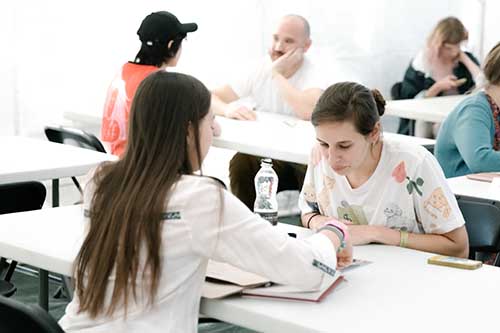
Portfolio reviews at the East London Comic and Art Festival in 2018
But how do you even get a portfolio review? Well it all starts with the following secret phrase: ‘Would you have time to look at some of my work?’ Try it at the next comic convention you’re at! You’ll be surprised how useful it is.
I asked a few of my artist friends if they’d ever requested a portfolio review at a comic convention, and almost all of them had. ‘I’ve sought out every chance I could for portfolio reviews,’ said Will Morris, writer and artist of The Silver Darlings and the fabulous new comic Gospel. For him it’s simply an opportunity to improve. ‘I hope I’ll always want to get better at making comics and getting feedback from fellow professionals and publishers has to be one of the best ways to identify what to work on.’
Will told me that even if you don’t always hear exactly what you might want to hear, these reviews can sometimes lead to other opportunities. ‘I’ve benefited from every portfolio review, even if the feedback can be hard to stomach in the moment. The very best of them have resulted in unbelievable opportunities, in particular my review with Eric Stephenson at Thought Bubble one year, which directly led to my Image miniseries, Gospel.’
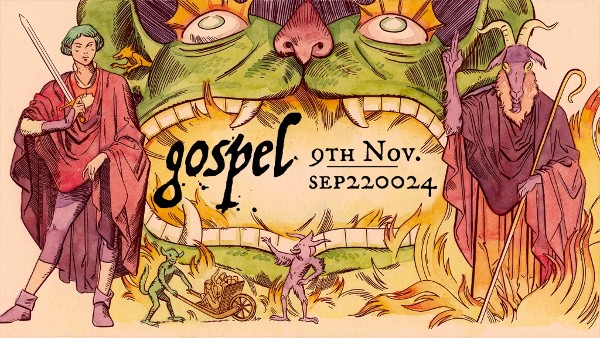
Advertising from the launch of Will Morris’s Gospel
But who do you ask for portfolio reviews? ‘When I wanted advice on where I was at, I would ask for reviews from creators I knew would give an honest assessment and advice on what I should do to improve my work,’ artist Marc Laming tells me. ‘Later when I was looking to break into mainstream comics, I would attend shows where I knew in advance that there would be editors looking at portfolios.’
Marc went out of his way to find these opportunities. ‘I think it is important to invest in yourself if you think you are ready for professional work and I would attend San Diego Comic Con in the USA and the big Bristol Show, Thought Bubble and Kapow in the UK. I always had a plan of who I wanted to see. Do your research and be prepared in advance.’
But managing your expectations is also important, Marc says. ‘Generally the reviews of my samples were very positive and any that had criticisms of my work, I would take on board, and use that feedback to produce better samples for the next year. It’s a marathon and not a sprint so don’t expect to be immediately offered work. Use it as an opportunity to build relationships.’
‘You don’t need to start with the big guns. All advice is relevant and it’s down to you as to how and if you use it,’ artist Paul Fry tells me. Paul’s work at Marvel, among others, came from showing his art at convention portfolio reviews. ‘Always look out for which editors are attending conventions and read the conditions – as the last few Marvel and DC portfolio reviews I know of set up reviews where you leave your portfolio at a certain place at a certain time. If the editor would like to see you, they call you or put up a post on a board in the convention area. Don’t be put off if you don’t get picked. Putting yourself (or your artwork) out there is half the battle, so be proud that you have made a step in the right direction and continue to practice.’ And does Paul have any other advice? ‘Yes! Come to my workshop at Portsmouth Comic Con next week.’
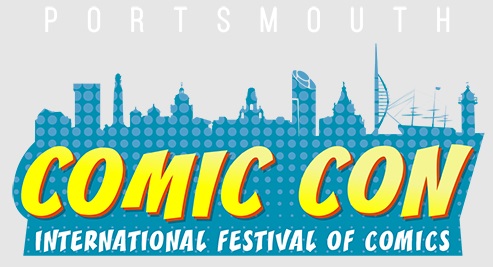
Speaking of Portsmouth, I ask artist Alison Sampson about the portfolio reviews she’s offering there. ‘Well, I will say first of all that when you say portfolio reviews, I mean nothing quite so formal. I’m happy to talk to anyone about their art!’
And what should people prepare? ‘Bring more than two pages, because then we can compare one page to another and you see where you’re going. Oh and preferably not on a phone, because when it’s on the phone, you can’t really engage with it in the same way. If you can print it, or get somebody to print it out, even if it’s Black and White, that’s great.’
And if she could offer one, single piece of advice to any artistic hopefuls? ‘Finish it. Whatever you’re working on – finish it! If you show half finished work, it’s almost impossible to assess. People may say nice things, but it’s not going to help you. Yeah, try and bring something that has reached the end of what you can do with it, even if it’s tiny.’
I’ve long been an advocate for making comics for the sake of making comics. I get annoyed when it’s assumed that every creator’s eventual goal is to ‘go pro’. It’s such a narrow focus, that diminishes the efforts of most of the practitioners working in the comics medium. I think when the topic of portfolio reviewing comes up, it’s often assumed that this push for professionalism is their sole focus – and that’s absolutely not the case. They’re about discovering what you want to improve, and how you can do that.
Alison is also keen to dispel these persistent portfolio review myths. ‘Sometimes with these things, there is an idea that portfolio reviews are for people who want to be professionals, and they come in with this black case with a handle and folio pages and all of this kind of thing. And they usually show it to the guys, and they often are guys, and I’m happy to look at that kind of work as well. But really, there is a lot more people out there who are doing slightly different things. You know, they’re making stickers, or they’re making graphics, or they’re drawing stuff that is important to them in a way that is a way they can do, which is another word for style. And it doesn’t have to be anything more than – you made this thing and we can help, you know, we can talk about it. If you liked it, if you like doing it, let’s talk about it. Let’s talk about your art, you can see mine, it’s mine, show me yours.’
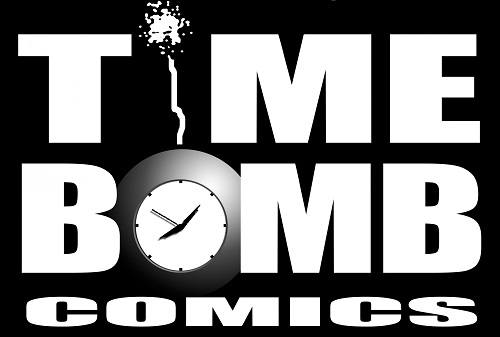
The best portfolio advice can sometimes sound obvious, but that’s perhaps only in hindsight. In his years of publishing as one half of the legendary Accent UK, and now as an integral part of the Time Bomb Comics operation Dave West has looked over many portfolios. I caught up with him at MCM in London last weekend to ask for his advice. ‘One thing I would say is don’t show someone your portfolio and then sort of apologise by saying, “It’s not my best work.” No one wants to hear an apology as they’re looking at your work. Also don’t show someone it unless it is your best work.’
‘If the review is with a comics editor, make sure sequential pages are the focus,’ Will Morris tells me. ‘If you have a review scheduled with a specific publisher, try to tailor your portfolio with themes or genres that you think will spark their interest. Most of all, remember to accept positive feedback and take any critique with grace. Not all feedback is going to feel valid and some will feel wounding, but I suspect it rarely helps your cause to leap to your own defence or make excuses. You can always ask for more clarity on specific comments. In truth, the critique is usually the good stuff, the stuff that’s going to help you to get better.’
‘Make sure you only bring your best work,’ Marc Laming tells me. ‘Have no more than 5-10 pages of sequential comics. Always be polite, listen more than you speak and don’t get upset if you hear something you don’t like or that hurts your feelings. The reviewer’s advice is being given to help you not hurt you.’
Both Marc and Alison also recommend reading Steve Leiber’s portfolio advice here.

Alison Sampson’s ‘Against All Odds’ cover
But before you run off to prepare a portfolio for your next convention trip, I wanted to ask someone in the know about how writers might participate in a similar process. I’m guessing there’s not much point in taking a comics script to show to a writer or editor? ‘If you’re writing comics, then yeah they need to be finished,’ writer Alec Worley tells me. ‘Remember a comics scripts is a disposable document, like a screenplay. It’s essentially a set of instructions that get thrown away once it’s served its purpose of producing a finished comic. Also reading takes time, whereas art can be scanned in a heartbeat.’
When I started making comics I drew some of my own stories, and asked friends to draw others. Printing, folding and stapling my own A5 comics was probably the most fun I’ve ever had in the medium – and I heartily recommend that everyone try it for themselves, regardless of professional aspirations. So if you’re a writer, the best advice seems to be either learn to draw yourself or go to a comic convention and meet some artists!
I hope there’s been some useful information for you here, and that it’s perhaps encouraged you to engage with the process that I’m beginning to regret referring to as ‘the portfolio review’. (Alison’s right – it makes it sound so formal!)
It’s important to remember that every comic creator at a convention has spent years honing their craft, and remembers being exactly where you are now – on the other side of the table, hoping to learn and improve.
So maybe just think of it as that: an opportunity to level up, by talking to someone who’s been playing the game a little longer than yourself.
But most importantly: please make some comics!
David Baillie is a writer and artist. Alison Sampson, Paul Fry, Marc Laming, Alec Worley, Dave West and Will Morris can all be found at Portsmouth Comic Con this weekend.
And if you do want to seek out a portfolio review near you, John Freeman has compiled a comprehensive list of of UK and Ireland comic conventions and events at Down the Tubes here.
Feature by David Baillie





